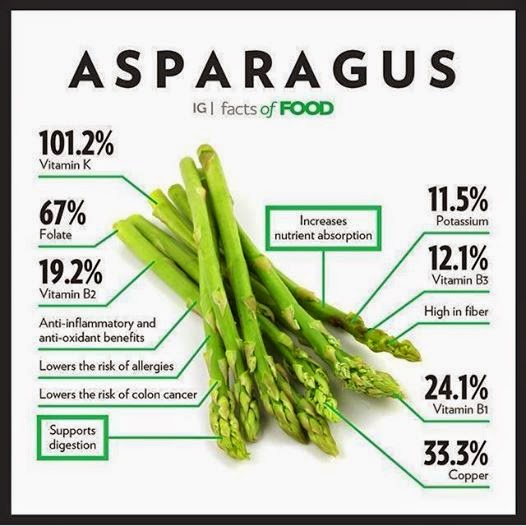How Healthy Is Asparagus? Unveiling The Nutritional Benefits

Table of Contents
Asparagus's Impressive Nutritional Profile
Asparagus is more than just a tasty treat; it's a nutritional powerhouse packed with essential vitamins, minerals, and antioxidants. Understanding its nutritional profile is key to appreciating its health benefits.
Vitamins and Minerals
One cup of cooked asparagus provides a significant boost to your daily intake of several vital nutrients.
- Folate: Crucial for cell growth and development, especially important during pregnancy.
- Vitamin K: Essential for blood clotting and bone health.
- Vitamin A: Supports vision, immune function, and cell growth.
- Vitamin C: A powerful antioxidant that protects against cell damage and boosts immunity.
- Potassium: Important for regulating blood pressure and maintaining fluid balance. Asparagus is a surprisingly good source of this vital electrolyte.
- Other Minerals: Asparagus also contains smaller amounts of magnesium, phosphorus, and copper, all contributing to overall health.
Antioxidant Powerhouse
Asparagus is rich in antioxidants, which combat free radicals – unstable molecules that can damage cells and contribute to aging and disease.
- Glutathione: A potent antioxidant that plays a crucial role in protecting cells from oxidative stress, supporting liver health, and boosting the immune system.
- Other Antioxidants: Asparagus also contains various other antioxidants, including flavonoids and phenolic acids, which work synergistically to protect your body. These contribute to its anti-inflammatory properties.
Health Benefits of Asparagus Consumption
The impressive nutritional profile of asparagus translates into a wide range of potential health benefits.
Improved Digestive Health
Asparagus is a good source of dietary fiber, which is essential for a healthy digestive system.
- Increased Satiety: The fiber content contributes to feelings of fullness, potentially aiding in weight management.
- Regularity: Fiber promotes regular bowel movements, helping to prevent constipation.
- Gut Microbiota: Fiber acts as prebiotic food for beneficial bacteria in your gut, promoting a healthy gut microbiome, crucial for overall digestive and immune health.
Heart Health Support
Several nutrients in asparagus contribute to cardiovascular health.
- Potassium: Helps regulate blood pressure, reducing the risk of hypertension and related heart problems.
- Folate: Plays a role in reducing homocysteine levels, a risk factor for heart disease.
- Antioxidants: Protect blood vessels from damage caused by free radicals.
Potential Cancer-Fighting Properties
Research suggests that asparagus may play a role in cancer prevention, although more research is needed to confirm these findings conclusively.
- Antioxidant Activity: The high antioxidant content combats free radical damage, which is implicated in cancer development.
- Specific Compounds: Certain compounds in asparagus, such as glutathione and other sulfur-containing compounds, have demonstrated potential anticancer properties in laboratory studies. These require further investigation in human trials. It is important to note that asparagus alone is not a cancer cure.
How to Incorporate More Asparagus into Your Diet
Adding asparagus to your diet is easier than you might think. It's versatile and delicious!
Delicious and Versatile Recipes
Asparagus is incredibly versatile and can be incorporated into many dishes.
- Grilled Asparagus: A simple and classic preparation, highlighting the asparagus' natural flavor.
- Asparagus Frittata: A healthy and protein-packed breakfast or brunch option.
- Asparagus Soup: A creamy and comforting soup, perfect for a light meal.
You can find numerous asparagus recipes online, catering to various tastes and dietary preferences.
Storage and Selection Tips
Choosing and storing asparagus properly is crucial to maintain its freshness and nutritional value.
- Selection: Look for asparagus spears that are firm, bright green, and have tightly closed tips. Avoid spears that are limp, wilted, or have broken tips.
- Storage: Store asparagus in the refrigerator, wrapped in a damp paper towel or plastic bag. It’s best to use it within a few days of purchase.
Conclusion
How healthy is asparagus? Incredibly so! This nutrient-rich vegetable is packed with vitamins, minerals, and antioxidants that offer a wide range of health benefits, from improved digestion and heart health to potential cancer-fighting properties. Discover the remarkable health benefits of asparagus today! Add this nutrient-rich vegetable to your meals and experience the difference. Share this article with your friends and family to help them discover the power of asparagus!

Featured Posts
-
 Kampens Strijd Voor Duurzame Energie Kort Geding Tegen Enexis
May 01, 2025
Kampens Strijd Voor Duurzame Energie Kort Geding Tegen Enexis
May 01, 2025 -
 Over The Counter Birth Control A New Era Of Reproductive Healthcare
May 01, 2025
Over The Counter Birth Control A New Era Of Reproductive Healthcare
May 01, 2025 -
 Preserving History Hudsons Bay Artifacts Complement Manitoba Donations
May 01, 2025
Preserving History Hudsons Bay Artifacts Complement Manitoba Donations
May 01, 2025 -
 Haland Ytsdr Trtyb Hdafy Aldwry Alinjlyzy Bed Mbarath Dd Twtnham
May 01, 2025
Haland Ytsdr Trtyb Hdafy Aldwry Alinjlyzy Bed Mbarath Dd Twtnham
May 01, 2025 -
 New Partnership For Prince William And Kates Charitable Initiative
May 01, 2025
New Partnership For Prince William And Kates Charitable Initiative
May 01, 2025
